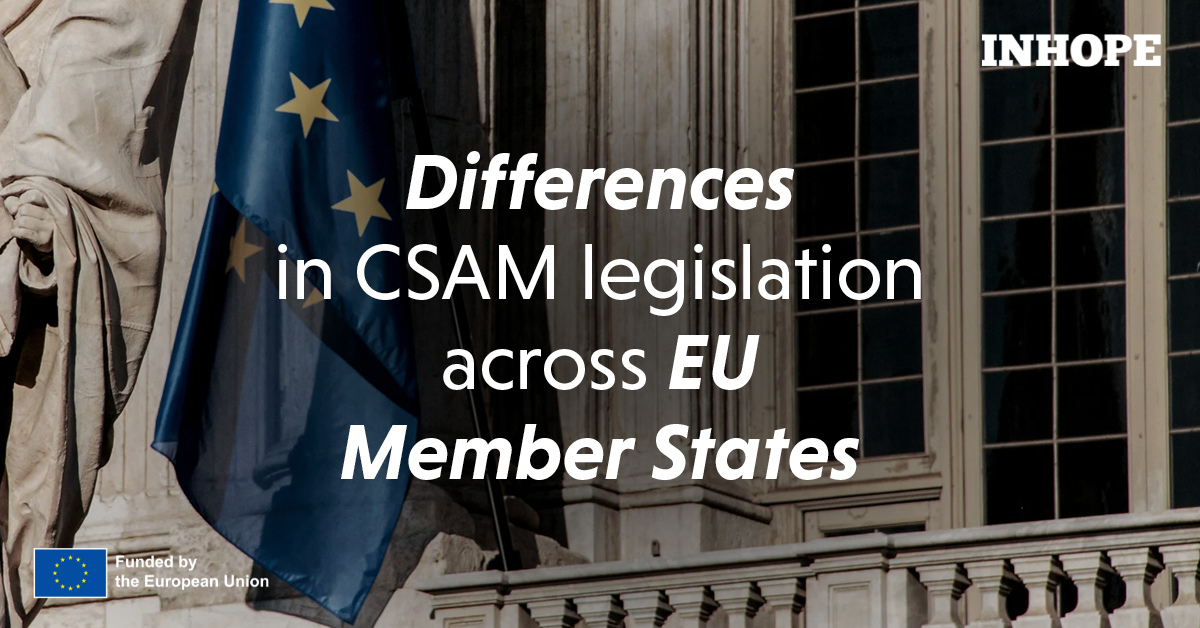Article
Industry News & Trends
INHOPE launches Legislative Overview of EU Hotlines
As part of the International Association of Internet Hotlines, INHOPE’s member hotlines play an invaluable role in providing the public with a way to report suspected child sexual abuse material (CSAM) and by rapidly removing harmful content online. Over the past twenty years, INHOPE has supported the establishment of national hotlines across the European Union (EU), which cooperate closely with national law enforcement agencies (LEA) to assist them in the rapid identification and safeguarding of CSAM victims.
One of the biggest challenges faced in the EU is covering many different legal jurisdictions where hotlines have different legal rights to process CSAM and the legality of CSAM varies depending on the content and context of the material. While the EU has promoted the establishment of hotlines in all Member States, the operation of hotlines has not been explicitly regulated in EU law.
That means that the legal capacity of hotlines still varies across the EU depending on laws and agreements concluded with national authorities. INHOPEs goal is to ensure that European member hotlines can follow a harmonised approach in tackling CSAM online. The legislative overview of EU hotlines and member states’ national law on CSAM showcases the current legal discrepancies in national jurisdictions. The report is based on facts and findings provided by national EU hotlines.
Publication Key Takeaways
-
There are discrepancies across EU Member States regarding the legality of CSAM depending on the content and context.
-
Drawings or artistic interpretations of CSAM are considered illegal in most EU countries. However, in six states drawings depicting child sexual abuse are not criminalised.
-
There are differences in the criminalisation of text depictions of CSAM. While a text describing the sexual abuse of children is currently illegal in ten EU states, ten other states (AT, BG, FI, GR, HU, PL, RO, SK, ES, SE) have no laws in place prohibiting this type of content. In six countries, namely Croatia, the Czech Republic, France, Denmark, Italy and Portugal the legality is determined by context.
-
Most member states do not have a legal definition of 'sexualised' and the legality of 'sexualised' images of children depends largely on the context in which the image was taken, the content and in some cases the intention of use by the creator of those images.
-
Most EU states agree that intimate images of children in a medical context (e.g. medical textbook) are not considered illegal.
-
There are legal differences across the EU, regarding the criminalisation of (1) non-explicit images in a series of CSAM and (2) non-explicit images containing comments or captions of sexual nature.
-
Six EU states (HR, CY, HU, NL, SK, SE), criminalise non-explicit images when they appear in a series of images containing CSAM. Non-explicit images containing sexual comments or captions are criminalised in eight EU states and not illegal in nine.
If we want to streamline and accelerate our approach to tackling CSAM online, we need to aim for harmonised guidelines across all EU member states. The aim is that all INHOPE member hotlines within the EU can operate in the same legal capacity.
Access the whole legislative overview here.
